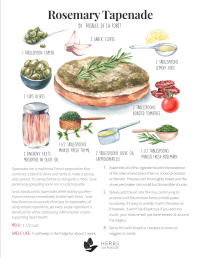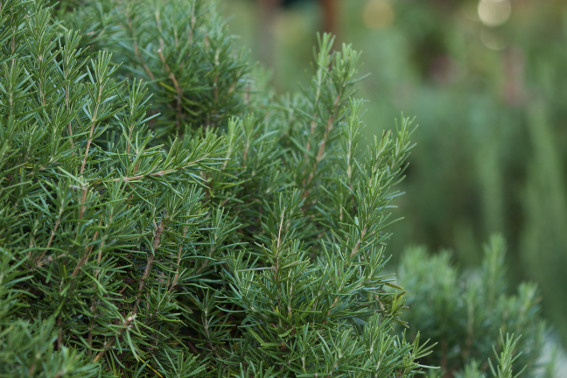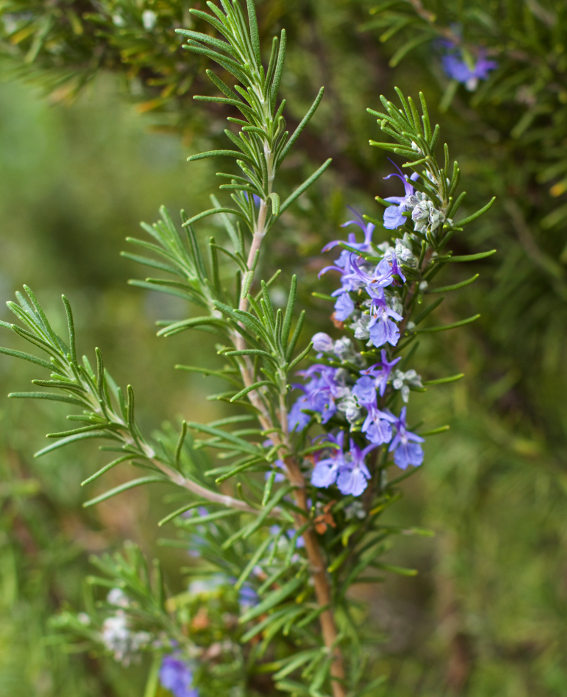Get weekly tips, recipes, and my Herbal Jumpstart e-course! Sign up for free today.
Rosemary Health Benefits
Share this! |
|
In this episode, I’m sharing six important rosemary health benefits, including a recipe for rosemary tapenade, which is a great way to address chronic inflammation (in a delicious way!). I love rosemary, not only for how it smells, but also because this plant truly blurs the line between what is food and medicine. In other words, this is a potent medicinal hiding in your kitchen cabinet!
When might you reach for rosemary?
► To boost your memory, reduce anxiety and depression, and improve sleep quality
► As a support for the heart and circulatory system, which is susceptible to oxidative stress. (Watch the whole episode to find out which herb British herbalist Jeremy Ross recommends pairing with rosemary for heart health…and when)
► To enhance your digestion, whether your digestion tends to be slow or cold or whether you’re eating a “heavy” meal
These are just a few of the occasions when rosemary can be your ally… But there are more, so tune in to the entire episode for all the details on the many rosemary health benefits!
After listening in, you’ll know:
► The best way to get your daily dose of antioxidants
► Which worked better for pain with menstruation: rosemary or NSAIDs
► What dosage of rosemary resulted in a significant beneficial effect on cognitive function in an elderly population in one short-term study
► Who needs to show caution in working with rosemary
► and much more
-- TIMESTAMPS --
- 00:00 - Introduction to Rosemary (Salvia rosmarinus)
- 03:27 - Rosemary Energetics
- 05:38 - Rosemary as the Queen of Antioxidants
- 06:34 - Rosemary Health Benefits Protect the Skin and Promote Oral Health
- 09:03 - Rosemary Health Benefits Support Heart Health
- 09:56 - Rosemary Health Benefits Reduce Pain
- 12:18 - Rosemary Boosts Memory and Improves Cognitive Health
- 14:20 - Rosemary Health Benefits Promote Healthy Digestion
- 16:28 - How to Identify Rosemary
- 17:38 - Special Considerations when Working with Rosemary
- 18:15 - Rosemary Recipe for Inflammation
- 24:05 - Herbal tidbit
Download Your Recipe Card!
l

Transcript of the Rosemary Health Benefits Video
Originally from the Mediterranean, rosemary now grows in gardens all over the world. This aromatic shrub has an enticing taste, making it loved in the culinary world, while rosemary’s health benefits as a strong medicinal herb make it a favorite amongst herbalists.
Rosemary has been deeply loved for thousands of year, whether it’s been for the kitchen or the medicine cabinet. The first writing about rosemary was recorded on cuneiform tablets over 7,000 years ago. Ancient Egyptians and Greeks were also known to reach for rosemary for rituals and ceremonies. As early as 1,800 years ago, rosemary was spread to modern-day China and, by the middle ages, it was commonly used in northern Europe as medicine. Spanish colonizers brought rosemary to the Americas, where it was embraced as medicine by some Indigenous peoples of the southwest.1
Today there are many different cultivars of rosemary available around the globe.
Rosemary is such a beloved plant! Do you have experience with rosemary health benefits? I’d love to hear about it in the comments on YouTube or at the bottom of this page. Your comments mean a lot to me! I love cultivating a community of kind-hearted plant-loving folks! Plus, it’s always interesting and insightful to hear the experiences of plant lovers out there. Your suggestion may also help others!
Rosemary Health Benefits: Energetics
Rosemary is a stimulating and aromatic herb. It’s often used to promote circulation and increase cognitive vitality.
One of rosemary’s health benefits is that it’s mildly warming, making it a great herb for many people, even for those who tend to be on the warmer side because it doesn’t create excess warmth the way that ginger and cayenne can.
If you’ve been following my episodes for awhile then you know I always start with herbal energetics. That’s because, while I could give you a list of herbal actions associated with rosemary health benefits, things like… antimicrobial, hepatic, or stimulant, it’s way more fun and effective to learn about rosemary through your own senses and herbal energetics.
If you are new to thinking about herbs and whether they are hot or cold or damp or dry, then it’s time to learn. This is a foundational concept of herbs that will really open up the world of herbalism for you.
My first book, Alchemy of Herbs, shows you exactly how to choose herbs that are best for you, based on herbal energetics. So if these concepts are new to you, check out that book to get a foundational understanding. There’s also an entire chapter about rosemary, including more of my favorite rosemary recipes. You can find Alchemy of Herbs wherever books are sold or pick up a copy at your library.
Back to rosemary being warming and stimulating. The best way to understand this is to feel it yourself when you’re working with rosemary. In the meantime, I found an interesting study relating to this.
People who have Reynaud’s phenomenon have difficulties with circulation and often have cold hands. In a small pilot study, patients were treated with an olive oil hand massage and then later with a rosemary oil, 10% dilution, hand massage. The results were that the “Topical rosemary essential oil increased warmth perception in patients with systemic sclerosis-related Raynaud's phenomenon.”2 Pretty cool study showing the practical application of herbal energetics!
Rosemary as the Queen of Antioxidants
The first of the rosemary health benefits I have to mention is that it is full of antioxidants. In fact, there are countless studies and articles celebrating its antioxidant richness!
Consuming antioxidants are an important part of modulating excessive inflammation in your body. When inflammation is out of control it can lead to pain and chronic illness.
Something that I find really interesting is that whole plant and whole food medicine is the BEST way to get your daily dose of antioxidants. Studies repeatedly show that taking antioxidant supplements aren’t nearly as beneficial.
And the good news is that rosemary is a delicious herb that is easy to add to your life.
As you’ll see, rosemary’s incredible antioxidant gifts show up again and again in the many ways we can benefit from this plant.
Rosemary Health Benefits Protect the Skin and Promote Oral Health
The second of the rosemary health benefits is for the skin. Rosemary has long been a favorite for skin health. It’s an ingredient found in the historically famous recipe Queen of Hungary’s water, which has been passed down through the generations for hundreds of years. This may have been the first distilled perfume in Europe and it was also considered an all-over beauty tonic. It’s easy to see why, given rosemary’s beautiful scent and skin-enhancing gifts.
Rosemary has also been shown to promote oral health. In a 2019 study a rosemary toothpaste effectively treated gingival bleeding and reduced bacterial plaque, when compared with conventional toothpaste.3
Rosemary and its constituents have been studied extensively for their benefits to skin health. For example they’ve been shown to protect against UVB-induced DNA damage in human skin in addition to being a potential chemopreventive agent upon UVB radiation.4,5
While more clinical trials are needed there have been some interesting in vitro and ex-vivo studies recently.
For example, a 2020 study showed that a formulation with rosemary, olive and citrus had photoprotective effects on skin cells with UVB-induced damage as well as decreased DNA damage.6
And I thought this was interesting! A 2021 study showed that a topical spray gel made with rosemary and spirulina is a good approach to prevent pollution-induced skin aging/damage.7
While it makes sense to use rosemary topically to protect the skin, it can also help you when you take it internally! A randomized, parallel group human study showed that internally taking a product that contained both rosemary and grapefruit decreased the UVB- and UVA-induced skin issues associated with sun exposure. Participants also showed an improvement in skin elasticity.8
Clearly rosemary is awesome for the skin! That’s why I always include rosemary antioxidants in my homemade skin care products. In addition to supporting your skin, rosemary is also wonderful for your hair. Check out my previous episode on Rosemary for Hair growth for more tips on how to work with rosemary for hair health, even if you aren’t dealing with hair loss.
Rosemary Health Benefits Support Heart Health
The third of the rosemary health benefits is for supporting the heart. In fact, rosemary’s high antioxidant levels are a wonderful match for the heart and circulatory system, which is susceptible to oxidative stress.
One review stated that rosmarinic acid, a constituent found within rosemary, is “underestimated as an experimental cardiovascular drug and deserves more attention.”9 (Of course as herbalists we love rosemary and give it lots of attention whether it’s strictly as medicine or joyfully taken as food as medicine.)
Rosemary is often used in formulations for the heart. For example, British herbalist Jeremy Ross recommends rosemary combined with hawthorn (Crataegus spp.) for people with cardiac weakness alongside depression.10
Rosemary Health Benefits Reduce Pain
The fourth of the rosemary health benefits is for addressing pain. While rosemary does not act like an over-the-counter pain reliever, it relieves pain in some interesting ways. It notably has the ability to address the root cause of the pain, rather than simply suppressing it.
Rosemary’s warming and circulation-stimulating properties are a good match for arthritic pain associated with coldness and stagnation. Rosemary’s ability to decrease oxidative stress can play a role in decreasing systemic inflammation (which can cause pain).
There have been a couple of interesting studies looking at rosemary’s ability to relieve specific kinds of pain. In one randomized double-blinded study, 82 students who had primary dysmenorrhea (which is pain with menstruation) were split into two groups. One group received rosemary capsules and the other received an NSAID drug often prescribed for menstrual pain. The results showed that rosemary capsules reduce the menstrual bleeding and primary dysmenorrhea the same as the NSAID.11 And I assume rosemary works the same but without the same common side effects commonly found in NSAIDs, but the study didn’t mention that.
Another study showed that topical application of rosemary can alleviate severity and frequency of recurrence of musculoskeletal pain in hemodialysis patients.12
While rosemary isn’t necessarily most people’s first choice for relieving pain, it’s fascinating to see how its ability to modulate inflammation means it can indeed decrease pain!
Chronic inflammation is THE leading cause of most chronic diseases, including chronic pain, heart disease, arthritis, back pain, skin conditions like eczema and acne, type 2 diabetes and so many more.
One of my passions is helping people figure out how to best work with herbs and lifestyle changes to powerfully reduce chronic inflammation so that they can finally address the root cause of their chronic illness.
I have a free training all about this called: How to Use Herbs to Transform Your Health to get More Energy & Vitality – Without Expensive Supplements or a Restrictive Elimination Diet.
You can access this free training at herb-training.com
Rosemary Health Benefits Boost Memory and Improve Cognitive Health
The fifth of the rosemary health benefits is for boosting your memory.
Rosemary is famously called the herb of remembrance and has long been used as a symbolic way to remember a loved one or event, such as in weddings and funerals. It was traditionally used to improve memory, and herbalists often recommend that students smell a sprig while studying and then again while taking their exams. Turning to rosemary to enhance memory is a tradition that goes back thousands of years and is still being studied today.
In a double-blinded randomized controlled trial, 68 students were given either rosemary or a placebo for a month. They were then evaluated in regards to their memory, depression and anxiety levels, and their sleep quality. The researchers concluded that “rosemary as a traditional herb could be used to boost prospective and retrospective memory, reduce anxiety and depression, and improve sleep quality in university students.”13 Seriously, I don’t know why they aren’t handing out rosemary to students on orientation day! I’ve thought this before and I’ll think it again, more herbalists should be in charge!
Not only does rosemary help with short-term memory, it may also have a role in preventing and addressing Alzheimer’s, which affects an estimated 1 in 9 people in the United States over the age of 65 and nearly 44 million people worldwide.14
In one short-term study, as little as 750 mg of dried rosemary had a significant beneficial effect on cognitive function in an elderly population.15
Another study showed that Alzheimer’s patients experienced cognitive benefits by simply smelling the essential oil.16
I want to be clear that no one is claiming that rosemary is a cure for Alzheimer’s. However, along with a holistic protocol, it shows promising results for addressing this debilitating disease.
Rosemary Health Benefits Promote Healthy Digestion
The sixth of the rosemary health benefits is for supporting healthy digestion. Rosemary’s slightly warming and aromatic nature makes it the perfect ally for your digestion.
Like other culinary herbs in the aromatic mint family, a tea made with rosemary can ease slow or cold digestion that is causing gas, nausea, cramping, or bloating. It has the additional benefit of a delicious taste, making it an easy culinary herb to add to vegetable, meat, or egg dishes. Rosemary is commonly added to dishes with lamb, not only for the flavor profile but also because of its ability to support liver health and the digestion of fats.
Rosemary has additional benefits for foods. Its high antioxidant levels and antimicrobial properties have made it a favorite for food preservation. Before the widespread use of refrigerators, rosemary was rubbed into meats to prevent them from spoiling.
Modern research has shown that rosemary does, in fact, prolong the quality and shelf life of meats through inhibiting the growth of bacteria.17
Rosemary also has the ability to reduce the risk of cancer from eating meats cooked on high heat. High-heat cooking methods, such as pan frying or grilling, creates compounds that have been shown to alter DNA and lead to cancer. In one study, researchers added rosemary extract to meats during cooking, and found that the high antioxidant content of rosemary helped prevent the formation of these carcinogenic compounds.18
While it would be best to avoid meats cooked at high temperatures, this illustrates rosemary’s protective effects, which assuredly go far beyond charred meats. For more information about this, plus to get a really unique recipe to use for grilling, see my interview with French herbalist Christophe Bernard, which is all about rosemary.
How to Identify Rosemary
When I was doing some research for this episode I looked at Nicholas Culpeper’s book; he’s an infamous herbalist from the 17th century and he stated: "Our Garden Rosemary is so well known, that I need not here describe it."
I almost went that route but figured it was worth sharing about it briefly.
Rosemary, also known as Salvia rosmarinus, is a member of the mint family and grows as a small woody shrub.
When growing in ideal conditions it can form a beautiful hedge or drape across rocks. While it excels in Mediterranean type climates, it can grow in relatively cold places as well.
Rosemary leaves are thin, needle-like, and very aromatic.
When it flowers the entire plant can be filled with blue flowers that bees and other pollinators flock to.
Rosemary is fairly drought tolerant, making it a great fit for low-water gardens. It is a bit tricky to grow indoors, but it can be done.
Special Considerations when Working with Rosemary Health Benefits
Rosemary is generally regarded as safe for most, especially when used as a whole herb rather than an extract or essential oil.
- During pregnancy and breastfeeding, it is safest to avoid rosemary in large doses. Normal culinary amounts are fine. The essential oil should also be avoided.19
- Rosemary may lower blood glucose. Those taking insulin should continue to monitor their blood glucose levels.20
- A very small percentage of people have skin dermatitis when exposed to rosemary.21
Rosemary Recipe for Inflammation
As you’ve seen there are so many rosemary health benefits; it’s a plant that many could benefit from having every single day! I love that there are so many ways to enjoy rosemary.
Rosemary is a delicious and aromatic culinary herb, which pairs well with vegetables and meats and it makes a lovely tea.
It can be infused into vinegar and/or honey which can be used as marinades or even throat gargles when sick. The aromatic and plentiful nature of rosemary also make it a favorite for hydrosols and steams. The dried plant can be infused into oil and then used while cooking or as part of a salad dressing.
One of my favorite ways to enjoy rosemary is as a tapenade.
Tapenades are a traditional French preparation that combines a blend of olives and herbs to make a savory, salty spread. It’s served before or alongside a meal. I love generously spreading some on a crusty baguette. I suggest using pitted olives that have been stored in oil or dry cured.
I was introduced to tapenades while visiting southern France and was immediately smitten with them. I love how there are thousands of recipes for tapenades, all using simple ingredients, yet every single ingredient is beneficial for either addressing inflammation and/or supporting heart health.
This is truly food as medicine!
This recipe is super simple, it’s simply a matter of blending some ingredients together. You can buy the olive, capers, anchovies and roasted tomatoes already prepared. There are literally thousands of different ways to prepare tapenades so feel free to play around with the recipe.
The ingredients for this tapenade are:
- 2 cups olives
- 1 tablespoon capers
- 2 anchovy filets preserved in olive oil
- 2 tablespoons lemon juice
- 2 tablespoons roasted tomatoes
- 3 garlic cloves
- 1 1/2 tablespoons minced fresh rosemary
- 1 1/2 tablespoons minced fresh thyme
- 2 tablespoons olive oil (approximately)
To make this, assemble all of the ingredients with the exception of the olive oil and place them in a food processor or blender. Process until thoroughly mixed and the olives are broken into small but discernible chunks.
Slowly add the oil into the mix, continuing to process until the mixture forms a thick paste. Go slowly; it’s easy to overdo it with the olive oil. (However, it won’t be disastrous if you add too much; your mixture will just have excess oil around the edges.)
Serve this with bread or crackers or even on veggies or meats. It will keep in the fridge for about 1 week.
This recipe can be found in my first book, Alchemy of Herbs. If you love food as medicine then you’ll love this book! It can be found wherever books are sold or pick up a copy at your library.
If you enjoyed this video on rosemary health benefits and you value trusted herbal information, then I hope you’ll stick around! The best way to get started is to subscribe on YouTube and your favorite podcast app.
One of the best ways to retain and fully understand something you’ve just learned is to share it in your own words. With that in mind I invite you to share your takeaways with me and the entire Herbs with Rosalee community. You can leave comments on my YouTube channel, at the bottom of this page, or simply hit reply to my Wednesday email. I read every comment that comes in and I’m excited to hear your herbal thoughts about rosemary and this rosemary tapenade recipe.
Tired of herbal overwhelm?
I got you!
I’ll send you clear, trusted tips and recipes—right to your inbox each week.
I look forward to welcoming you to our herbal community! Know that your information is safely hidden behind a patch of stinging nettle. I never sell your information and you can easily unsubscribe at any time.
Okay, you’ve lasted to the very end of the show which means you get a gold star and this herbal tidbit…
Rosemary’s botanical name has changed in recently years as part of botanists' efforts to better group plants together who are more closely related. Rosemary used to be named Rosmarinus officinalis. Now that has changed since rosemary has been added to the Salvia genus, recognizing it as a sage. It retained its previous genus name as the species name, becoming Salvia rosmarinus.
Rosmarinus means dew of the sea, a beautiful and fitting name for this Mediterranean plant that loves to grow next to the sea.
One of my favorite memories of being in France was hiking the Calanques, which are steep limestone cliffs in southern France, and cresting a ridge to find lots of rosemary on the hillside next to the sea. It was such a beautiful site and instantly made me think of its name meaning dew of the sea.
Wherever rosemary grows near you, I recommend finding some of the fresh plant to inhale its lovely scent.
Enjoy rosemary!
Citations for Rosemary Health Benefits
Click to show/hide.
Rosalee is an herbalist and author of the bestselling book Alchemy of Herbs: Transform Everyday Ingredients Into Foods & Remedies That Healand co-author of the bestselling book Wild Remedies: How to Forage Healing Foods and Craft Your Own Herbal Medicine. She's a registered herbalist with the American Herbalist Guild and has taught thousands of students through her online courses. Read about how Rosalee went from having a terminal illness to being a bestselling author in her full story here.


